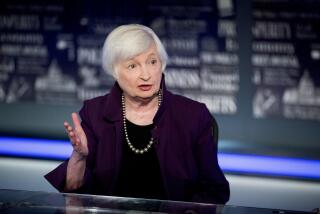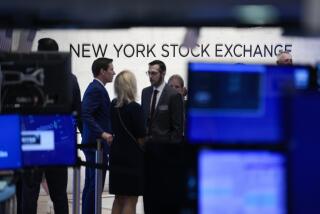Debt ceiling deal casts a bleak light on the future
The last-minute deal on the debt ceiling may prevent a government default, but it does little to avert a perfect storm of economic problems that could push the nation toward a new downturn and more financial pain for millions of Americans.
Instead of increasing confidence in the future, the agreement seems to have underscored the near paralysis in Washington — and the fact that no substantial new efforts are likely for dealing with unemployment, lagging consumer spending or a host of other problems that have been dragging the economy down.
“By itself, it doesn’t do anything to solve the problems down the road,” said Roberton Williams, an economist at the nonpartisan Tax Policy Center, referring to the budget deal that is estimated to cut the federal deficit by about $2.1 trillion over the next decade.
The stock market provided an early indicator Monday that investors and business leaders saw little to cheer about. Stocks initially rallied on the debt-ceiling pact, then tumbled after a report showed that U.S. manufacturing activity slowed sharply in July, reinforcing other weak economic data.
In a volatile session, share prices rebounded by the closing bell. The Dow Jones industrial average lost 10.75 points, or 0.1%, to 12,132.49 — after being up as much as 137 points, then down as much as 144 points.
The manufacturing data followed the government’s report Friday that the economy grew at a dismally slow 1.3% annualized rate in the second quarter.
“Double dip is back on the agenda,” said David Ader, head of government bond strategy at CRT Capital Group in Stamford, Conn., referring to the possibility of another recession.
Those concerns helped drive some investors into Treasury bonds as a haven Monday, pushing longer-term interest rates to new lows for 2011. Relief over the debt-ceiling deal also stoked demand for Treasuries.
As buyers swarmed, the yield on the 10-year Treasury note fell to 2.75%, down from 2.80% on Friday and the lowest since November.
More bad news is expected Friday, when the government releases July employment data. Analysts anticipate that the economy added a paltry 85,000 net new jobs last month.
Given the weak economy, some analysts were encouraged that the debt deal put off serious cuts in federal spending in the early part of this decade. And with the risk of a Treasury default off the table, the agreement could also help the economy a bit if businesses feel more confident about spending some of the cash they have been stockpiling.
The budget deal shaves just $25 billion in federal discretionary spending in 2012, leaving most of the cuts in later years. But even that relatively modest amount “would certainly create another headwind for the economy,” said Gary Schlossberg, senior economist at Wells Capital Management in San Francisco.
The economy has been dogged by fundamental weaknesses, including a depressed housing market. Now there will be a pullback by one of the few players that had been driving growth — Uncle Sam.
Some economists argue that cutting down big government would help growth later as the private sector tries to pick up the slack. But fiscal spending reductions could undermine long-term prospects in a global economy that has few engines firing.
The U.S. cannot rely on Europe and Japan, which have serious problems of their own. And China’s economy may slow as Beijing tries to put on the brakes and curb inflation.
On Monday, the Congressional Budget Office projected that the debt deal could reduce the deficit by $2.1 trillion through 2021, but that’s based on economic assumptions made in March before it was clear the economy had slowed significantly.
What’s more, the nation’s triple-A credit rating still could be lowered despite the debt ceiling deal because the economy’s weakness this year has made the deficit situation worse, said Ajay Rajadhyaksha of Barclays Capital.
“That lower growth in 2011 will add about $1.2 trillion to the deficit over the next 10 years, which wipes away most of the savings we’re supposed to get from this deal,” he said.
Some economists had forecast U.S. growth of 4% this year, but the Conference Board, a business-supported research group in New York, doesn’t see it going above 2%, with similarly anemic growth next year as well.
What’s missing in the budget deal is a game plan to spur growth and jobs, said Kathy Bostjancic, an economist at the Conference Board. As such, she said, the nation’s struggle with budget deficits and spending “could be played out and fought on the political scene over the next decade.”
Bostjancic said the budget agreement is positive, but she doesn’t think it will do much to push companies to invest the $2 trillion in cash they have been sitting on.
“There’s no timetable that suggests they have to do something with the cash,” she said. “What’s going to be the catalyst for growth?”
The U.S. stock market has held up remarkably well in recent weeks despite the debt drama in Washington and a barrage of disappointing economic data. The Dow index is down a modest 5.3% from its multiyear high reached in late April.
Bruce McCain, who helps oversee $22 billion in client assets as chief investment strategist at Key Private Bank in Cleveland, said many investors are sticking with the view that economic growth will pick up in the second half of the year.
“In the short-term we’ve convinced ourselves that this is a soft patch that’s going to let up,” he said.
Many analysts believe that the U.S. economy, while struggling, is unlikely to fall back into recession absent some kind of unexpected shock.
Economists at Deutsche Bank Securities in New York last week slashed their third-quarter estimate for U.S. economic growth to 2.5% from 3.5%. Carl Riccadonna, senior economist at the firm, said he expected business spending and export growth to help keep the expansion going.
“We think the worst-case scenario is that we struggle forward at a pathetic pace,” Riccadonna said.
Times staff writer Jim Puzzanghera contributed to this report.







